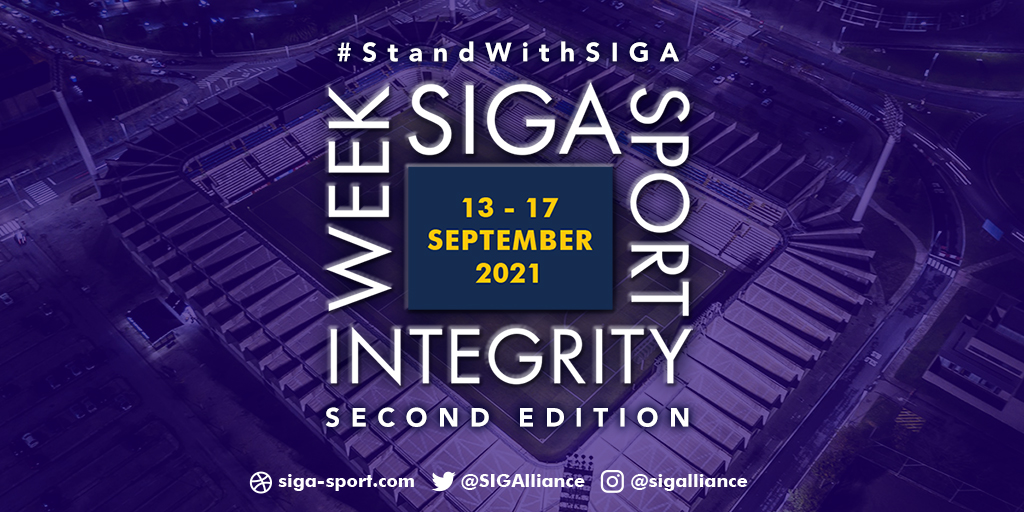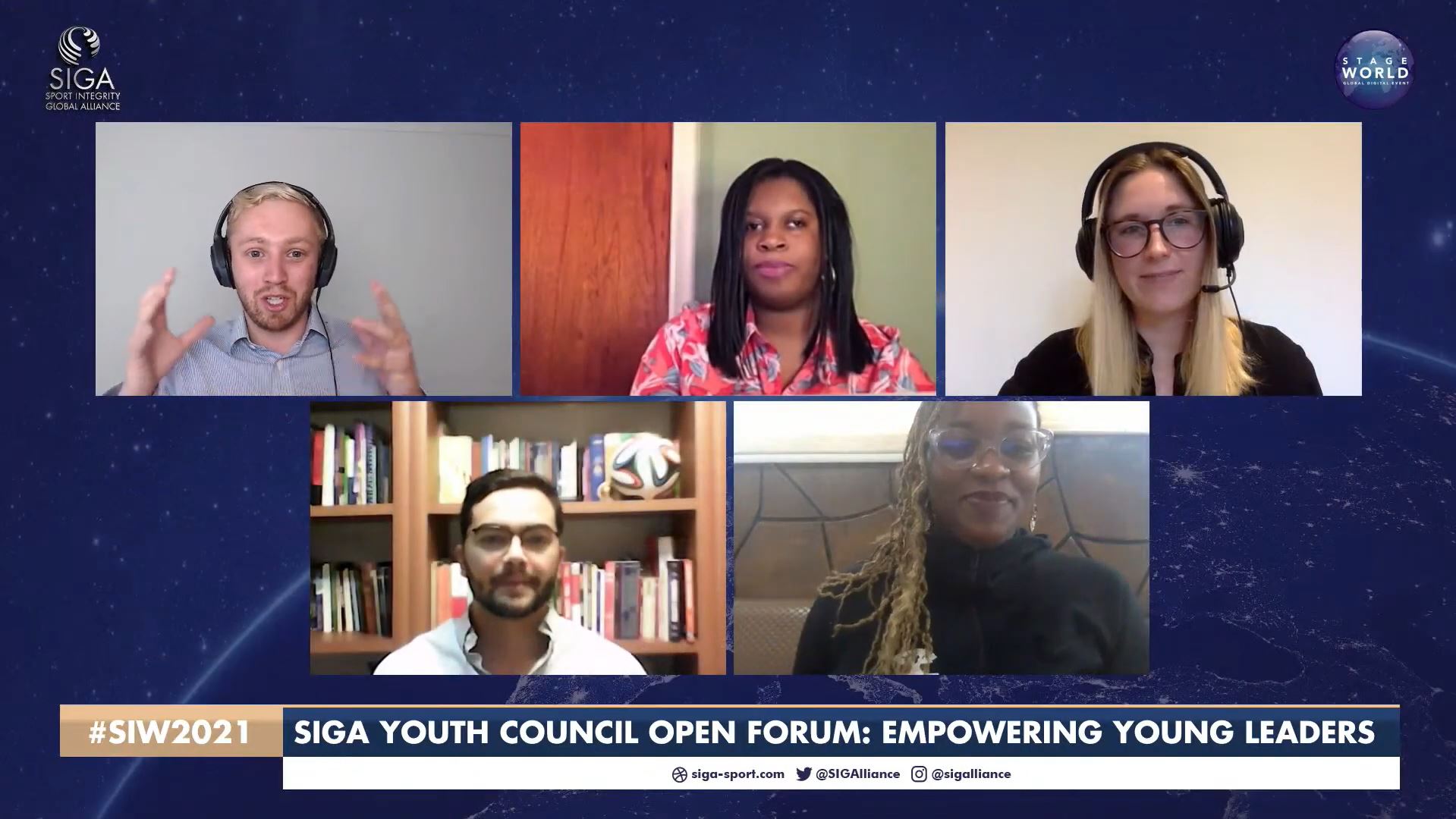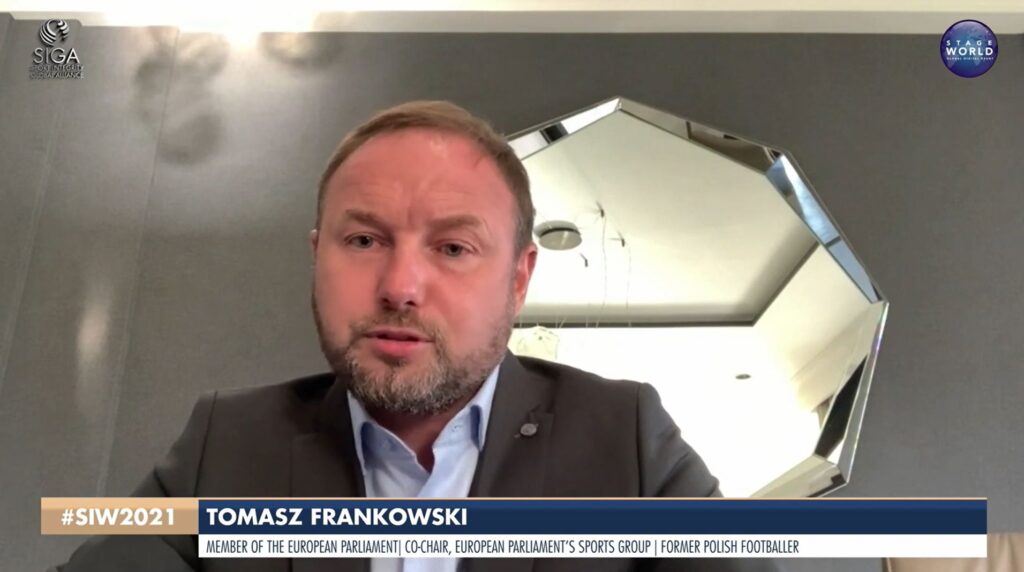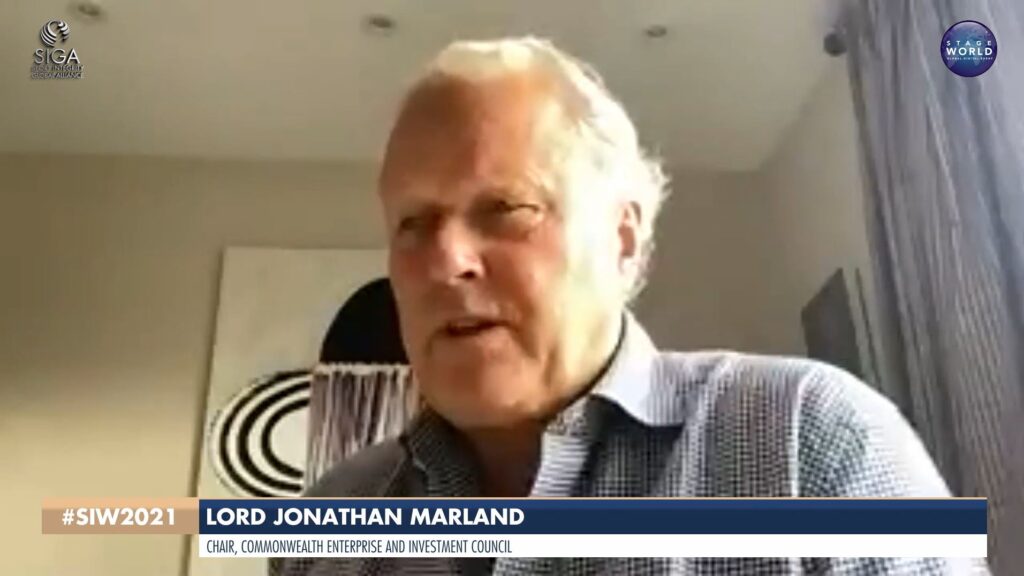Day two of the Sport Integrity Week 2021 (14th September) on Financial Integrity, Transparency and Sustainability In Sport reunited high-level panellists, and top Keynote speakers. Today, included in SIGA Weekly number 4 (22nd October), we are happy to share the first part of day 2 re-run.
Don’t miss the chance to watch on-demand.
SIGA Youth Council Forum: Empowering Young Leaders
(Watch here)
What is leadership?; What are the benefits of getting out of the comfort zone?; and how to develop leadership skills?. Forum’s moderator Ed Bowers, Director of Education2Sport Limited, set three main questions as goals for the panel, and got the most interesting replies from the SIGA Youth Council members that participated.
Taylor Green, Youth Council’s Chair, has no doubts: “A leader is someone who can help others to be their best selves. With leadership comes responsibility and accountability”.
Maureen Rosita Ebob-Besong, French-African Foundation Young Leader, believes that “a leader is a doer”, and will always “get out of his comfort zone”:
“To lead is all about inspiring trust, showing the example, mobilising the people and resources in a way that enables advance. Service is a key aspect of leadership. Being a boss is something else…”
Tomás Medeiros, lawyer and also a member of the SIGA Youth Council confessed his “passion for sport”, and explained that he wants his voice “to be heard”:
“By combining Sport with law, it gave me a different perspective from the game on the field. I joined SIGA and the youth council, to make sport cleaner, safer and better”.
Tarryn Horner, Grant Support Executive at the Football Foundation, sees sport as “a fantastic platform to teach skills like leadership, relationship building, learning confidence, equality, diversity”. She believes, therefore, “Sport allows to encompass all those things”.
Keynotes – Tomasz Frankowski and Lord Jonathan Marland
(Watch here)
Tomasz Frankowski, Member of the European Parliament; Co-chair, European Parliament’s Sports group and former Polish Footballer, and Lord Jonathan Marland, Chair at the Commonwealth Enterprise and Investment Council delivered inspiring Keynotes to launch the Webinar on “Integrity In Sport: The Key to Recovery”.
Integrity in Sport: The Key to Recovery
(Watch here)
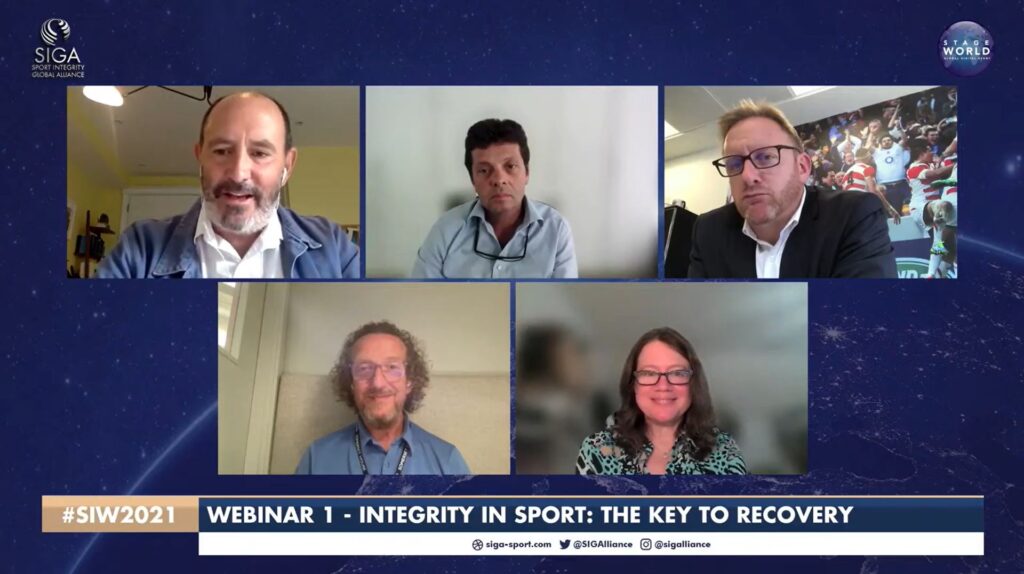
“Recovery with Integrity” is the driving force of all public investments being made around the world, with taxpayers money, to rescue global society and economy from the most devastating health, economic and social crisis ever experienced by humankind. All nations, all sectors are deeply affected, and Sport is no exception. Whilst the future remains uncertain, one thing is clear: to exert its role, safeguard its survival and sustainability, and act as a dynamo of social and economic development to help the world to “Recover with Integrity,” Sport and the wider business industry must lead by example. This is what is the session is all about and shines a light on what sports organisations are doing to place integrity at the podium.
Moderated by Dan Mannix, CSM North America, Senior Advisor & Former CEO, this panel had Andrea Traverso, Director, Financial Sustainability & Research at UEFA; Alan Gilpin, CEO at World Rugby; Andy Westlake, Chairman at the European Sponsorship Association; and Lisa Levine, General Counsel at the National Women’s Soccer League
Andrea Traverso, Director, Financial Sustainability & Research at UEFA
“When the pandemic started, we were in the middle of our competitions, and at the same time we were going to hold Euro-2020. We had to review everything and stop the competitions. We had to make decisions like postponing the Euro to allow national leagues to end. Agility, flexibility and the necessity to adapt quickly to the new environment, being innovative, were our main needs. The pandemic had a massive effect on the finances of the clubs. European football clubs owe among them 6 Bn euros. It is like a domino. One of the key elements we have to focus on during this period is to prevent that this becomes contagious, as it will increase the lack of liquidity”
Alan Gilpin, CEO at World Rugby
“We discovered during the pandemic that authenticity, therefore Integrity, is absolutely key to bring fans back to the sport, and also to attract new fans. Fans expect more from us. They need to believe what they see on the field, whether it is related to anti-corruption or anti-doping perspective. We have to uphold our values at the heart of everything we do. Covid showed we had to be more agile, to be able to adapt our competition models”.
Andy Westlake, Chairman at the European Sponsorship Association
“Sports at all levels were under pressure due to Covid-19. Our research shows sport has lost 23 per cent of sponsorship revenue in Europe, and that impact will be felt very hard by clubs and leagues. As we begin to recover, we see the power of sports as a thing that can genuinely connect communities on the post-pandemic. There is a real ability for sponsors to contribute both to that feeling of well-being and positivity and to cover the financial hole in which organisations find themselves. Sponsors want to be a part of the dialogue, and they want to embed good purpose activations in their programs”.
Lisa Levine, General Counsel at the National Women’s Soccer League
“It’s interesting to hear about the drops in sponsorships revenues, because we were able to add a number of partners. We were very fortunate. The fact that we are a relatively small group, allowed us to work with our partners and put up an exciting competition in a bubble. Working with our medical staff we created protocols that were put into place quickly. Lot of lessons were learned about how to quickly adapt.”
Keynote – Giovanni Tartaglia
(Watch here)
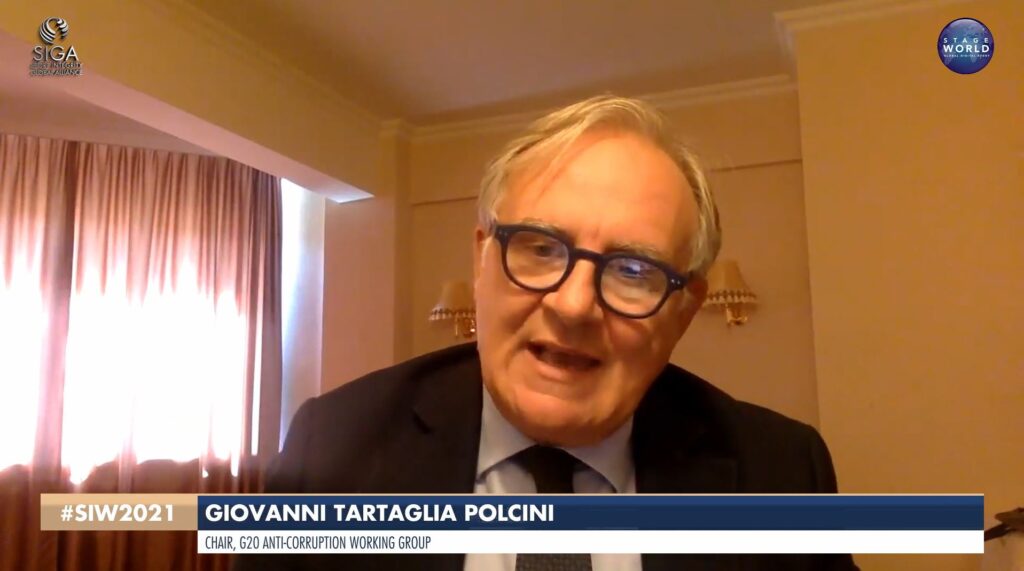
Giovanni Tartaglia Polcini, Chair of the G20 Anti-Corruption Working Group, Keynote introduced the panel “The Name of the Game: Follow the Money”, making clear for all participants that fighting corruption in Sport requires a new approach: Follow the Money.
“We are living a difficult time, fighting new and sophisticated forms of corruption linked to organised crime. Sport is one of the most important risk areas for corruption. When we allocate the concept of follow the money, we follow the best practices. This global multilateral agenda aims to level the playfield and avoid the infiltration of organised crime in sport. We have to show the way: We believe in a new philosophy, moving from multi-stakeholder to multi shareholder approach. We want to call civil society, private sector, business, and academia to create the basis of a new environment devoted to legality”.
The Name of the Game: Follow the Money
(Watch here)
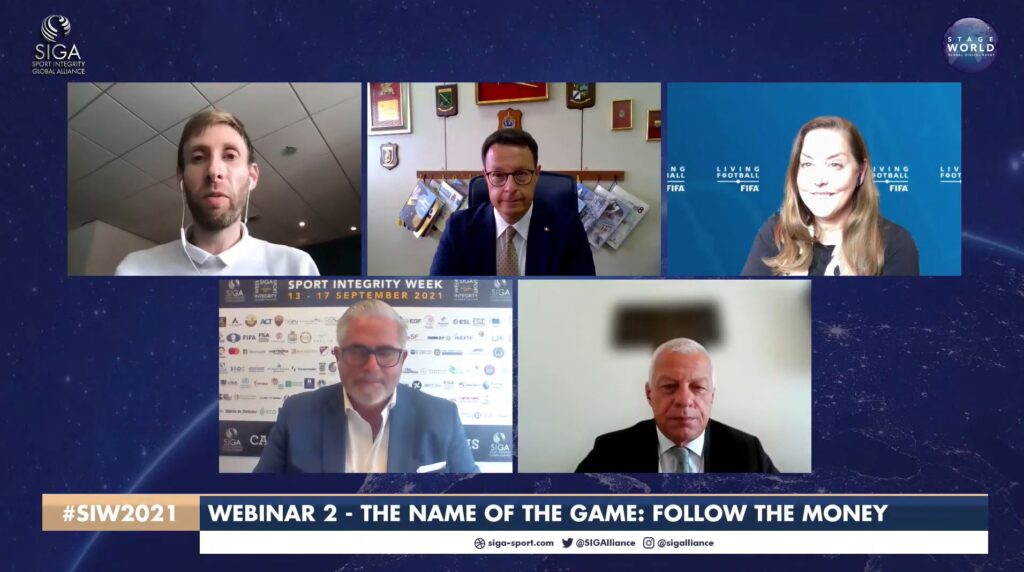
Who pays what and to whom? Where is the money coming from? Where is it going to? Who are the ultimate beneficial owners that control the clubs and pull the strings? These questions are right at the root of financial integrity, transparency, and sustainability in Sport.
Against this background, what are sports governing bodies, governments, economic regulators, financial industry services and law enforcement doing to ensure Sport is governed and operates under the highest integrity standards, with appropriate financial supervision, due diligence and oversight? What is being done to safeguard sport from transnational money laundering, tax evasion and criminal infiltration? Those were the main topics in this session.
Roberto Ribaudo Head of the 5th Division, Guardia di Finanza, Italy, Dept for Public Security at Ministry of Interior; Central Directorate of Criminal Police, International Police Cooperation Service
“Match-fixing has been affected by the pandemic. By now, we have seen a shift of interest from the biggest matches to other matches, or minor sports, in other region, such as Africa or Asia, or even minor leagues in Europe. This has led to an increase of the percentage of illegal betting. That was a change during the pandemic”.
Drago Kos, Chairman, OECD Working Group on Bribery in International Business Transactions | Co-Chair, MENA – OECD Business Integrity Network
“The topic of corruption in Sport has been discussed for 15, 20 years now. We do understand the problems. Sport has become interesting for criminal infiltration because there is a lot of money involved. Sports organisations can be relatively misused by criminals, because they have a good public image and are independent from states. That makes them ideal targets… Athletes sometimes face a very difficult financial situation, so if they decide to fix just one match, they can earn more than what they are paid for competing. All this is influencing the level of corruption in Sport. It is hard to find an efficient tool to tackle corruption. There were some attempts, but they were almost instantly killed. Solid Universal Standards to tackle bribery were attempted, but some countries have strongly opposed to do something meaningful and pratical”.
Emily Devlin, FIFA, Director of Corporate Legal, Legal & Compliance Division
“In 2015 the new FIFA president was elected, and now we see a change in how the administration approaches things like good governance and ensuring the money that FIFA distributes is properly used. First and foremost we are a governing body, but we are also a development organisation. One of the most important roles we have is to make football truly global, ensuring money goes where it has to go. The US Department of Justice considered FIFA, as an organisation, as victim of individuals who have syphoned huge sums of money from football for their benefits”.
Emanuel Medeiros. Global CEO, SIGA | Chairman & CEO, SIGA AMERICA | Executive Chairman, SIGA EUROPE
“Follow the Money is not the name of a movie. It is a necessary attitude to understand what ramifications of the system have proven to be vulnerable to criminal infiltration. This vulnerability is now being exacerbated by the collateral effects of the global pandemic. There is increasing penetration of organised crime in Sport. Sport has limited power. It doesn’t have the jurisdiction or the means to tackle matters that go beyond the sporting sphere. Even if Sport had the most robust and proactive leadership would not be able to solve these problems alone. What we need is a united front. We need governments and international organisations to once and for all prioritise the prevention and fight against corruption, money laundering and tax evasion”.
– END –
ABOUT SIGA
SIGA is the world´s largest coalition in the field of sport´s governance and integrity. Supported by more than 100 international multi-industry supporters, SIGA is an independent and neutral organisation whose mission is to bring about meaningful reforms and enhance the integrity of all sports through a set of universal standards operated by an independent and neutral body. SIGA is the only organisation to bring together sport, governments, academia, international organisations, sponsors, business, rights holders, NGOs and professional services companies, from every region in the world, around a common cause of fostering greater integrity throughout sport. Click on the hyperlinks for the list of SIGA Members and Committed Supporters and SIGA Partners.
For more information on SIGA, including its vision, mission and reform agenda, please refer to the website: www.siga-sport.com. To contact SIGA, please email: comms@siga-sport.com.
Find SIGA on Twitter at https://twitter.com/SIGAlliance,
Instagram at https://www.instagram.com/sigalliance/?hl=en
LinkedIn at https://www.linkedin.com/company/sigalliance/.

